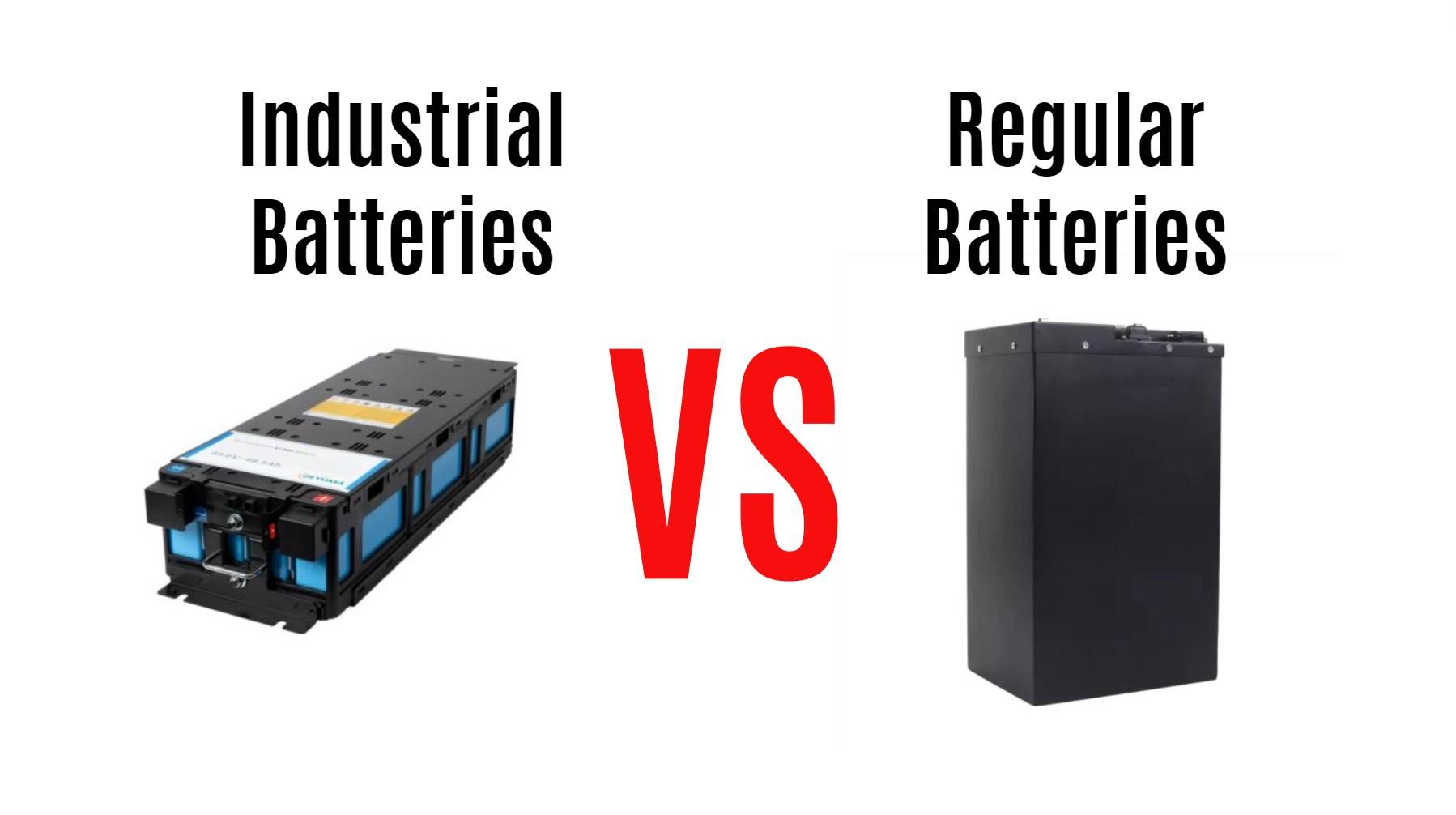Beyond the batteries we use daily, like those in remotes and flashlights, there’s a lesser-known world of industrial batteries. These powerful units are vital to many industries due to their durability and performance. In this blog post, we’ll compare industrial batteries to regular ones, helping you choose the right type for your requirements. Let’s explore these essential energy sources!
Defining industrial batteries and regular batteries
Understanding the differences between industrial and regular batteries is crucial for selecting the right power source for various applications. While both types serve to provide energy, they are tailored for distinct purposes.
- Purpose:
- Regular batteries are for everyday consumer electronics like remotes and toys.
- Industrial batteries are for heavy-duty use in sectors such as manufacturing, telecommunications, and renewable energy.
- Construction:
- Industrial batteries are robust, built to endure harsh conditions like high temperatures and frequent charging cycles.
- Regular batteries lack the durability needed for industrial settings, focusing more on convenience and portability.
- Size and Design:
- Industrial battery packs are larger to accommodate higher energy storage requirements.
- Regular batteries are smaller and standardized for use in common household devices.
- Power Output and Longevity:
- Industrial batteries deliver substantial current for extended periods, ideal for uninterrupted operations in demanding environments.
- Regular batteries are suitable for low-power devices with limited energy needs and shorter lifespans.
- Cost Comparison:
- Industrial batteries may have a higher initial cost but offer better value over time due to their durability and extended lifespan.
- Regular batteries are more cost-effective for everyday use but may require frequent replacement.
Conclusion: Selecting between industrial and regular batteries depends on the specific requirements of the application. Understanding their differences in construction, size, power output, longevity, and cost helps in making an informed decision.
The purpose and usage of industrial batteries
Industrial batteries are essential for powering heavy-duty equipment and machinery in various industries. Their reliability and consistent power output make them indispensable for critical applications.
- Backup Power:
- Industrial batteries provide uninterrupted power during outages for critical systems like backup generators and emergency lighting.
- They ensure continuous operation, preventing downtime and potential losses in production.
- Renewable Energy Storage:
- These batteries store excess energy from sources like solar panels and wind turbines, ensuring a stable electricity supply.
- They help balance energy demand and supply, contributing to the efficiency of renewable energy systems.
- Electric Vehicles:
- Industrial battery packs in electric vehicles enable longer travel distances and reduce reliance on fossil fuels.
- They support sustainable transportation by providing high-capacity energy storage.
- Manufacturing Equipment:
- Industrial batteries power material handling equipment like forklifts in manufacturing plants.
- Their long-lasting performance ensures efficient operation throughout the day, enhancing productivity.
Conclusion: Industrial batteries serve diverse purposes across industries, from providing backup power to supporting renewable energy and transportation. Their robust design and reliable performance make them indispensable for critical systems and equipment.
The purpose and usage of regular batteries
Regular batteries, also known as consumer batteries, are indispensable power sources in our daily lives, powering a wide array of devices from household electronics to emergency equipment.
- Household Electronics:
- Remote controls, clocks, toys, and portable electronics like cameras and MP3 players rely on regular batteries for prolonged operation.
- They provide the necessary voltage for these devices to function efficiently, especially when electrical outlets are unavailable.
- Emergency Preparedness:
- Flashlights, radios, and other emergency equipment depend on regular batteries for reliable power during power outages or emergencies.
- These batteries ensure essential devices remain functional when electricity is not accessible.
- Industrial Applications:
- Regular batteries are used in various industries like construction and automotive to power tools and equipment requiring mobility or off-grid operation.
- They provide convenient energy solutions for critical tasks, enhancing efficiency and productivity in these sectors.
Conclusion: Regular batteries serve diverse purposes, powering everyday gadgets and critical equipment across different sectors. Their compact size and reliable energy output make them indispensable for both convenience and essential functions.
Differences in design and size
The design and size of industrial batteries and regular batteries differ significantly, reflecting their respective purposes and applications.
- Industrial Batteries:
- Larger in size to accommodate higher capacity and power output for heavy-duty use.
- Designed with durability in mind, with robust casings to withstand harsh environments and extreme conditions.
- Regular Batteries:
- Smaller and more compact, suitable for everyday devices like remote controls and toys.
- Lightweight and easily replaceable, emphasizing convenience for consumer electronics.
- Shape and Standardization:
- Industrial batteries may come in standardized sizes like AA or D cells, with some flexibility for custom shapes.
- Regular batteries are available in various standard sizes such as AAA, AA, C-cell, or coin cell (e.g., CR2032).
Conclusion: The design and size differences between industrial and regular batteries align with their intended usage and environments. Consider the specific application and size constraints when choosing between them for your needs.
Differences in power and longevity
Power and longevity are key factors that distinguish industrial batteries from regular batteries, impacting their suitability for various applications.
- Power Output:
- Industrial batteries deliver consistent high-power output over long durations, ideal for critical applications like telecommunications or emergency backup systems.
- Regular batteries provide shorter bursts of power, suitable for everyday devices with intermittent usage.
- Capacity and Longevity:
- Industrial batteries have higher capacity and longer lifespans due to their robust construction, making them suitable for heavy-duty use.
- Regular batteries, though smaller and less durable, are sufficient for portable electronics but may degrade faster with frequent use.
- Construction and Durability:
- Industrial batteries are built to withstand harsh conditions like extreme temperatures and vibrations, ensuring reliable performance in demanding environments.
- Regular batteries lack the durability to handle such conditions and may require replacement more often.
Conclusion: Consider your specific needs when choosing between industrial and regular batteries. Industrial batteries offer superior power and longevity, albeit at a higher upfront cost, while regular batteries are more cost-effective for everyday gadgets with lighter usage requirements.
Cost comparison between industrial and regular batteries
Cost is a significant consideration when choosing between industrial and regular batteries, with industrial batteries generally being more expensive due to their specialized design and higher power output.
- Industrial Battery Cost:
- Industrial batteries are pricier because they are built for heavy usage in demanding environments like manufacturing plants or emergency backup systems.
- Despite the higher upfront cost, they often provide better long-term value due to their durability and extended lifespan.
- Regular Battery Cost:
- Regular batteries are cheaper and commonly used for everyday devices with lighter usage demands.
- While they have a lower initial cost, they may require more frequent replacement compared to industrial batteries.
- Longevity and Value:
- Industrial batteries tend to last longer and offer superior performance, making them a cost-effective choice for businesses or individuals requiring continuous power supply.
- Assessing usage demands, required power output, and available budget will help determine which type of battery is the best fit for specific needs.
Which type of battery is best for your needs?
Choosing between industrial and regular batteries depends on your specific needs and circumstances. Understanding their differences in performance, cost, and suitability for different applications is essential for making an informed decision.
- Industrial Batteries:
- Best suited for heavy machinery or equipment in industrial settings due to their robust design, high capacity, and long lifespan.
- Despite a higher upfront cost, they offer reliable performance over extended periods, making them cost-effective for businesses requiring uninterrupted operations.
- Regular Batteries:
- Ideal for everyday consumer electronics or smaller devices like remote controls or toys, offering convenience and portability.
- Widely available and affordable, regular batteries are suitable for most household needs but may require more frequent replacement.
- Cost Considerations:
- While industrial batteries have a higher initial cost, they often prove more cost-effective in the long run due to their durability and longevity.
- For individuals or households with typical electronic needs, regular batteries are a more economical choice.
Conclusion: Evaluate your specific requirements, budget constraints, and long-term goals before deciding between industrial and regular batteries. Consider consulting with experts in energy storage systems for tailored advice, and always prioritize safety when handling any type of battery.




